| A most musical and impressive piece. | ||
| —Musical Opinion |
Click the quotation text to discover what it refers to!
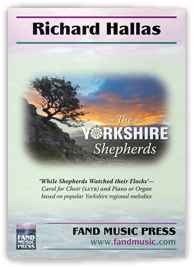
| It’s a great piece … It’s a medley of a most distinctive kind and people will love it. | ||
| —Simon Lindley, Organist Emeritus, Leeds Minster etc. |
While Shepherds Watched their Flocks is believed to have been sung to as many as one hundred tunes as part of a wider English carolling tradition. Many such melodies are regional and have been passed down the generations, both orally and in private handwritten collections, without being formally published (at least, until recently). They survive thanks in part to the well-established and centuries-old carolling tradition in Yorkshire, which is centred in various villages to the north-west of Sheffield, heading towards Holmfirth and Huddersfield. This carolling tradition, which exists mainly in village pubs but also in churches, chapels, halls, homes and the open air, lives on today.
At least eight versions of While Shepherds Watched their Flocks continue in popular use in the Yorkshire carolling tradition, and it is virtually universal for them all to be sung with just four verses rather than the full set of six. Verses 1–3 and 6 are retained; verses 4 and 5 are omitted.
The Yorkshire Shepherds celebrates the popularity of this carol in the Yorkshire carolling tradition by setting the words of the four commonly sung verses to four different regional melodies. The chosen tunes are ones that are both well established and that fit well together; not all four melodies were actually composed in Yorkshire, but they all have strong Yorkshire connections and have become well established in, and remain popular because of, the music-making of the region.
More extensive notes about the four regional melodies used for the verses are provided with the music, but the melodies are, in order: Cranbrook (better known as On Ilkla Moor Baht ’At); Shaw Lane; Liverpool; Sweet Chiming Bells. In addition, the extremely familiar tune that is normally used for this carol, Winchester Old, is used in fragmentary form in the accompaniment of this setting to provide short interludes between verses and to tie the piece to the familiar. Although not sung as part of the piece itself, it may also be used for optional audience participation at the end; see the Performance notes.
Overall, this is a light-hearted and attractive arrangement that could provide a satisfactory ending to a Christmas concert, perhaps as an interesting encore, or could simply slot anywhere into a light carol concert programme. The setting is not intentionally comedic, but it takes a lightly humorous approach to its subject matter. In particular, uninitiated audience members are likely to be surprised and amused by the choir’s initial entry to the tune of On Ilkla Moor Baht ’At. (Note that this is not a gimmick: the usage is authentic, and the melody predates the ‘Ilkley Moor’ words by half a century or so.)
This piece may be performed in any of three ways:
1. Short endingIf the performers want a rousing ending with a choral finish, the piece may be terminated just after the voices stop singing, with a ‘short ending’. The final page of music (an optional coda) is then omitted entirely. |
This is the St Augustine’s Singers, directed by Philip Mead, giving the piece’s second performance (in Cambridge, 17th December 2016). | |
2. Instrumental codaThe optional coda may be played through just once by the accompanist. This produces a performance that may seem quieter and less impactful, but that may be considered more musically rounded. The coda takes the form of a single, complete statement of Winchester Old on the piano/organ. |
This is a synthetic rendition generated by Sibelius from the typeset score. Although the wordless choir sounds leave something to be desired, the piano rendition is actually extremely convincing, and gives an excellent impression of how the accompaniment should ideally be played. | |
3. Audience participationChristmas carol concerts often involve audience participation. This piece makes provision for this possibility by permitting the concertgoers to sing the words of the carol to the familiar tune that they know at the end, after the choir has finished singing the four Yorkshire verses. Having informed the audience in advance of what will happen, the conductor would turn around as the choir finishes and start conducting the audience (and choir) in a unison rendition of the carol to the tune Winchester Old for as many verses as are desired. (All six verses are supplied for this purpose.) |
This is The Huddersfield Singers, conducted by Alexander Douglas, giving the first performance of the piece as the last item in the concert for which it was written: A Yorkshire Christmas on 3rd December 2016. Unfortunately, the piano accompaniment goes somewhat awry at the transition between the choir’s performance and the start of the audience participation (compare with the Sibelius rendition…), but the effect is quite successful nevertheless (and it went down very well with the audience). In this particular performance, the audience sings verses 1, 3, 5 and 6. |
Fand produces its music booklets to a very high quality, and they normally include expensively-printed full-colour covers, which both look very attractive and, by being robust, make the copies easier to use on music stands and add considerably to their useful lives. Unfortunately, the colour covers are much more expensive to print than the music pages they enclose, and thus greatly increase the price of the copies overall.
We are very well aware that many choirs struggle to cover their ongoing costs, and simply cannot afford to purchase luxury-quality copies. Therefore, given that multiple copies are needed by any choir to put on a performance, we are also making choral parts available more cheaply, without the nice colour covers. (The full-price scores and the choral parts are absolutely identical apart from the fact that the cheaper parts lack the nice covers.) This keeps costs to a minimum and, we hope, should make the music more affordable to amateur groups.
We therefore suggest that when ordering a set of music, choirs might like to take the following approach:
Bear in mind that the copies are A4-sized booklets, and are therefore large enough to be shared by two singers if necessary.
Of course, if your choir is well off and wants a set of high-quality copies that will stand the test of time, then by all means order the more expensive scores for use by the singers, too! But we hope that the provision of cheaper choral parts will put this music within the reach of typical impoverished groups.
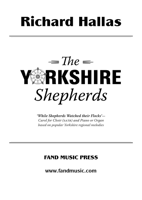
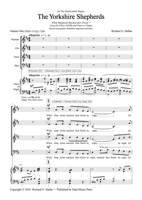
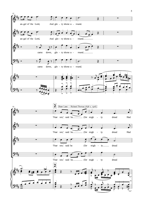
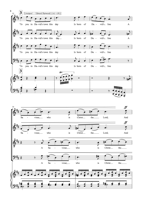
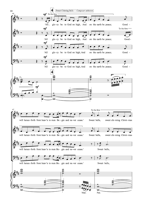
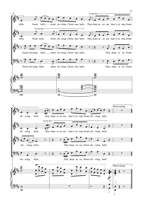
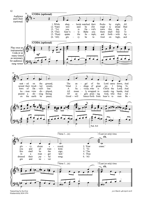
(Click to enlarge)
| Composer | Title | Forces | Duration | ||
|---|---|---|---|---|---|
| Richard Hallas Words: Nahum Tate | The Yorkshire Shepherds A setting of the carol “While Shepherds Watched their Flocks” based on Yorkshire regional melodies for choir (SATB) and piano or organ | Choir (SATB), Piano, Organ | 3 mins | ||
| Parts | |||||
| |||||
The sound sample provided in the information table above is synthetic, created with Sibelius from the typeset score. Despite the lack of real singers, the piano accompaniment in particular comes across extremely well, so it’s worth having this rendition in order to hear a note-perfect account of how the piece should really sound!
Additionally, we have recordings of the piece’s first two public performances. The Huddersfield Singers, conducted by Alexander Douglas, gave the première, in the concert for which the piece was written (A Yorkshire Christmas), on 3rd December 2016:
Finally, we also have a video of the second performance, a couple of weeks later:
This video is of the St Augustine’s Singers, Cambridge, directed by Philip Mead (with Clare Simmonds, piano), giving the second performance of The Yorkshire Shepherds at a lunchtime concert on 17th December 2016 at St Michael’s Church, Cambridge. Thanks to Dan Leighton for providing the video and to Philip Mead and his choir for the committed rendition.
Catalogue code: FM199 • Published: 3rd July 2016
Entry last updated: 15th January 2017